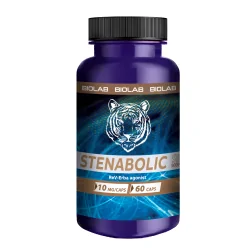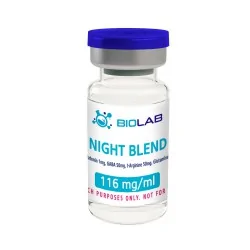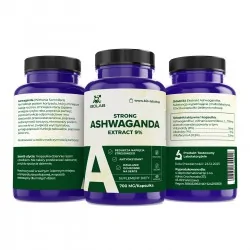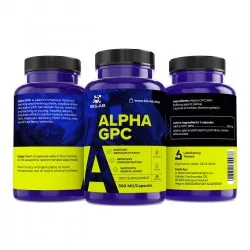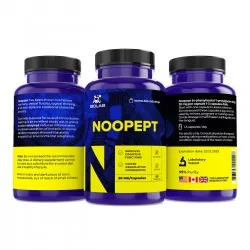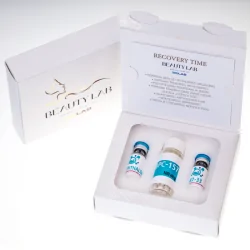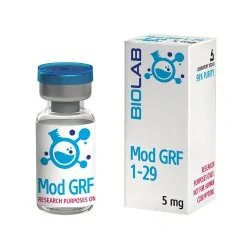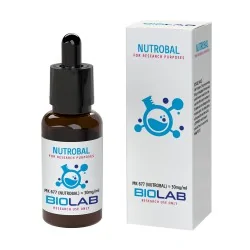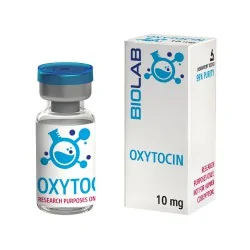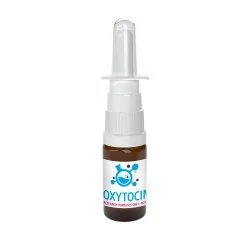-
Peptides
Peptides
back
-
- show all
-
-
Purpose
Return
- Peptides for bodybuilding
- Biomimetic peptides
- Peptides for the gym
- Peptides for bulk
- Natural peptides
- Peptides for joints
- Peptides for reduction
- Peptides for fat burning
- Peptides for weight loss
- Peptides for the muscles
- Peptides for regeneration
- Peptides for libido
- Peptides for injuries
- Peptides for athletes
- Peptides in tablets
- Peptides in injection
- Spray peptides
-
Type
Return
- BPC 157
- hgh
- ghk-cu
- ghrp-6
- ghrp-2
- grf
- tb-500
- oxytocin
- semax
- melanotan
- pt-141
- epithalon
- selank
- thymosin
- cjc-1295
- ipamorelin
- peg-mgf
- adamax
- kisspeptin
- dsip
- sermorelin
- n-acetyl
- arg-bpc
- thymalin
- 5-amino 1MQ
- alarelin
- mots-c
- igf-1 Lr3
- IGF DES
- GHRP2
- Fragment
- CJC DAC
- Adamax
- Cortagen
- Snap 8
- B7-33
- Melanotan 2
- Selank
- Thymosin alpha 1
- Mots
- VIP
- LL-37
- Livagen
- P-21
- KPV
- Ara 290
- L21
- Acth 1-39
- matrixyl
- TRH
- Larazotide acetate
- glp-1
- GC-1 SOBETIROME
- TB-4 FRAG+BPC-157 ARG
- AOD-9604
- cardiogen
- prostamax
- pancragen
- bronchogen
- retatrutide
- Thrombin peptide Tp508
- SLU-PP-332
- LIPOTROPIN
- THYMOGEN ALPHA-1
- Nutrobal
-
Purpose
Return
-
Peptide calculator
-
- show all
-
- Sarms Sarms back
-
- show all
-
Produkty
- Amino acids Amino acids back
-
- show all
-
Aminokwasy
-
- show all
-
Produkty
- Supplements Supplements back
-
- show all
-
Supplements
-
Purpose
Return
- Weight Loss Supplements
- Supplements for memory and concentration
- Energy supplements
- Hair and nail supplements
- Cholesterol supplements
- Supplements for the complexion and skin
- Sleep supplements
- Gym supplements
- Supplements for reduction and sculpture
- Eye and vision supplements
- Supplements for stress and nerves
- Supplements for regeneration and fatigue
- Strength and fitness supplements
- Joint supplements
- Liver supplements
- Acne Supplements
- Kidney supplements
- Knee supplements
- High blood pressure supplements
- Cellulite supplements
- Bone supplements
- Tendon supplements
- Supplements for potency and libido
- Dopamine supplements
- Serotonin supplements
-
Type
Return
- Ashwagandha
- Omega 3
- Vitamin D3
- Magnesium citrate
- N-Acetylcysteine
- Biotin
- Collagen
- L-Theanine
- 5-Hydroxytryptophan
- Forskolin
- Resveratrol
- Coenzyme Q10
- PQQ
- Rhodiola rosea
- Canna
- Kava Kava
- TUDCA
- Cholinolytics
- berberys
- inozytol
- sodium butyrate
- lactoferrin
- selenium
- cordyceps
- Quercetin
- lions mane
- glycine
- curcumin
- alpha lipoic acid
- shilajt
- apigenin
- dim
- chasteberry
- baikal thyroid
- reishi
- pycnogenol
- phosphatidylserine
- chromium picolinate
- astragalus
- nad+
- tulsi
- egcg
- magnesium citrate
- nalt
- pana ginseng
- synephrine
- zinc picolinate
- cherry tart
- magnesium taurate
- magnesium l-threonate
- adaptogens Return
-
Purpose
Return
-
- show all
-
Produkty
- Nootropics Nootropics back
-
- show all
-
Nootropy
-
- show all
-
Produkty
- Beauty Beauty back
-
- show all
-
- Preparation Preparation back
-
- show all
-
- Pre-workouts
- Slimming preparations
- Preparations for the joints
- Acne preparations
- Preparations to strengthen the body
- Preparations for the sinuses
- Erection preparations
- Hair preparations
- Preparations for the liver
- Nail preparations
- Sleep preparations
- Intestinal preparations
- Circadian rhythm disorders
- Preparations for the heart
- Preparations for libido
- Preparations for malnutrition
- Preparations for sedation
- Preparations for strengthening
- Preparations for the kidneys
- Fat burning preparations
- Preparations to reduce appetite
- Preparations for growth
- Preparations for depression
- Preparations for energy
- Bone preparations
- Preparations for muscle mass
- Skin bronzing preparations
- Skin rejuvenating preparations
- Preparations for the condition
- Preparations for the work of the brain
- Anti-aging preparations
- Preparations for regeneration
- Growth hormone replacements
- Injury preparations
oxytocin
Showing 1-2 of 2 item(s)- Type
-
- BPC 157
- hgh
- ghk-cu
- ghrp-6
- ghrp-2
- grf
- tb-500
- oxytocin
- semax
- melanotan
- pt-141
- epithalon
- selank
- thymosin
- cjc-1295
- ipamorelin
- peg-mgf
- adamax
- kisspeptin
- dsip
- sermorelin
- n-acetyl
- arg-bpc
- thymalin
- 5-amino 1MQ
- alarelin
- mots-c
- igf-1 Lr3
- IGF DES
- GHRP2
- Fragment
- CJC DAC
- Adamax
- Cortagen
- Snap 8
- B7-33
- Melanotan 2
- Selank
- Thymosin alpha 1
- Mots
- VIP
- LL-37
- Livagen
- P-21
- KPV
- Ara 290
- L21
- Acth 1-39
- matrixyl
- TRH
- Larazotide acetate
- glp-1
- GC-1 SOBETIROME
- TB-4 FRAG+BPC-157 ARG
- AOD-9604
- cardiogen
- prostamax
- pancragen
- bronchogen
- retatrutide
- Thrombin peptide Tp508
- SLU-PP-332
- LIPOTROPIN
- THYMOGEN ALPHA-1
Filter By
Price
Price
-
€34.00 - €38.00
Active filters
Oxytocin - how does the remarkable "love hormone" work?
Oxytocin is primarily associated by many with motherhood. This is not surprising, since it plays a huge role both during the birth itself and later - in lactation and during the bonding between the mother and the newborn child. However, not everyone knows that the possibilities of this protein hormone do not end there.
In addition to accelerating labor, oxytocin can positively affect, among other things, human cognitive function, digestion, blood pressure or even... self-confidence. One thing is certain: this substance still has not revealed all its cards to mankind, and a short answer to the question of what is oxytocin seems impossible.
Oxytocin - what is this chemical compound?
Oxytocin - a hormone
From the point of view of science, oxytocin is an endogenous hormone, which means that the body is able to produce it on its own (under the right conditions, of course).
Oxytocin - a peptide
Oxytocin - made up of nine amino acids - can also be successfully called a peptide neurotransmitter or, more briefly, a neurohormone. It is naturally produced in the hypothalamus, to be transported with the help of neurons up to the pituitary gland. However, advances in science have also made it possible to obtain it synthetically in the laboratory. This, in turn, has made it possible for you, too, to enjoy its benefits today.
Oxytocin - what is it responsible for and what is worth knowing about it?
As we mentioned at the very beginning, one of the most primary functions of oxytocin is to accelerate labor. It is due to the hormone that labor contractions appear and then intensify, which, although not very pleasant, are essential in the process of natural childbirth. In the absence of progress in labor action (or so-called carried pregnancy), synthetic oxytocin by injection or drip is usually used.
When the baby is already in the world, the hormone continues to work, and in two ways. First, it positively affects lactation and thus makes it easier for the mother to breastfeed. And secondly, it strengthens the bond forming with the baby, enhancing empathy and a sense of attachment, among other things.
Oxytocin - less common functions
Wound healing
As oxytocin exhibits anti-inflammatory and pain-relieving properties, it will be an ally of anyone who trains regularly. After all, injuries happen to everyone. It will help you get back into shape faster and go through the process of eventual recovery more easily.
Improve cognitive performance
Cognitive performance is the name for all the functions of our mind by which we recognize (see, process, understand) the reality around us. Thus, these include memory or the ability to concentrate. Oxytocin is able to improve them, acting from the level of the central nervous system, and studies indicate that in the future it may become helpful, for example, in the treatment of Alzheimer's disease.
Building interpersonal relationships
Yes. Although the first association is between a mother and her newborn child, oxytocin also facilitates other types of relationships, such as friendships. By acting on par with norepinephrine and dopamine, it can also give you a boost of positive energy, a desire to act or feel good.
Mitigating the effects of diabetes
No one who suffers from the disease or has a loved one among those affected needs to be convinced of the unpleasant effects of diabetes. Meanwhile, oxytocin is able to regulate the secretion of insulin and glucagon, hormones crucial for maintaining adequate blood sugar levels.
Maternal type 1 diabetes is also an indication for intrapartum administration of oxytocin in the form of an IV.
Stress Reduction
As the "love hormone" regulates the functioning of the HPA, the axis between the hypothalamus, pituitary, and adrenal glands, it is capable of reducing stress. For this reason, oxytocin has been of interest as an aid in alleviating post-traumatic stress.
It is also worth mentioning that oxytocin also affects other social behaviors, such as empathy, confidence or trust in others.
Oxytocin - other effects
What other good things does oxytocin do? It can, for example, lower blood pressure that is too high and reduce the so-called cardiovascular risk (the likelihood of serious complications associated with hypertension) or have a positive effect on the digestive process and the key intestinal peristalsis. For some people, the fact that oxytocin sometimes reduces appetite will also be an advantage.
As you can see, therefore, oxytocin's action is definitely multifaceted and is capable of affecting more aspects of the human body than just the most widely discussed ones.
Oxytocin in men
In men, oxytocin plays another important role. This is because it can stimulate libido, lowered, for example, due to high amounts of stress, age, exhaustion or a not particularly healthy lifestyle. In addition, oxytocin, by increasing desire, also helps to achieve and then maintain an erection.
If we add the information that this peptide hormone has a positive effect on female orgasm, it turns out that it is a good, natural companion for fulfilled couples.
In what form can oxytocin be taken?
Postpartum oxytocin is usually administered in the form of an IV. This is, of course, an effective and safe form, but it is difficult to imagine such a treatment at home. A convenient alternative turns out to be intranasal sprays with oxytocin, used in the same way as the well-known catarrhal drops.
In the Oxytocin Spray from Biolab, you'll find everything you need to make your own spray: the peptide in powder form, saline to make the solution, a syringe for easy dosing of the ingredients, and an atomizer for convenient use of oxytocin.
Newsletter
SIGN UP AND STAY UP TO DATE!
We specialize in wholesale and retail supply of high quality peptides.
((modalTitle))
((confirmMessage))
((title))
- Preparation Preparation back
- Beauty Beauty back
- Nootropics Nootropics back
- Supplements Supplements back
- Amino acids Amino acids back
- Sarms Sarms back
-



